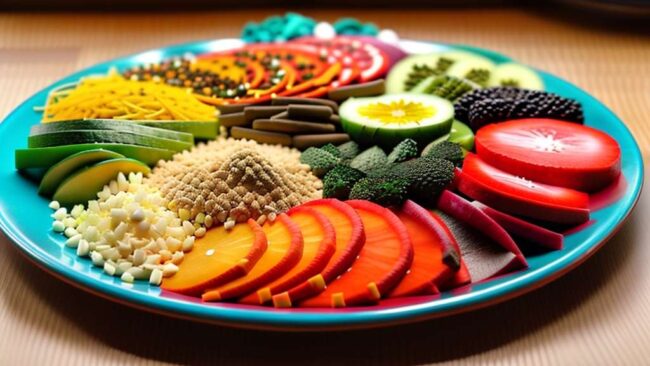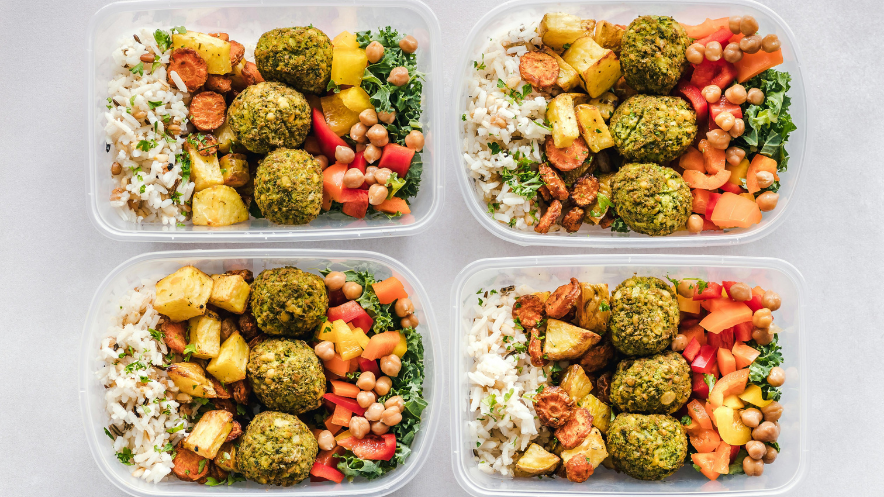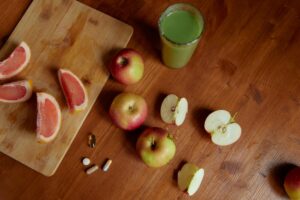“Key Foods for Preventing Type 1 Diabetes”
Discover the essential foods to prevent Type 1 Diabetes. Expert guidance on key dietary choices for optimal health. Stay informed.

Type 1 diabetes is a chronic condition that affects millions of people worldwide. While there is no known cure, research suggests that certain foods may help in preventing this condition. In this blog post, we will explore key foods that have been identified for their potential role in reducing the risk of developing type 1 diabetes. Whether you’re someone with a family history of the disease or simply interested in maintaining a healthy lifestyle, understanding the impact of these foods can be valuable knowledge. So, let’s delve into the world of nutrition and discover the power of food in preventing type 1 diabetes.
Here are seven key foods that you should consider adding to your diet to help prevent Type 1 Diabetes
Fatty Fish: Fatty fish such as salmon, mackerel, and sardines are rich in omega-3 fatty acids, which have been linked to a reduced risk of Type 1 Diabetes. These healthy fats also provide numerous other health benefits, including promoting heart health.
Leafy Greens: Leafy greens like spinach, kale, and Swiss chard are packed with essential vitamins, minerals, and antioxidants. These nutrients play a crucial role in supporting the immune system and reducing inflammation, which is believed to contribute to the development of Type 1 Diabetes.
Whole Grains: Opting for whole grains instead of refined grains can help lower the risk of Type 1 Diabetes. Whole grains like quinoa, brown rice, and whole wheat bread contain more fiber, which helps regulate blood sugar levels and improve overall blood glucose control.
Legumes: Beans, lentils, and chickpeas are excellent sources of plant-based protein and fiber. Including legumes in your diet can help promote better blood sugar control and decrease the risk of Type 1 Diabetes.
Probiotic Foods: Foods rich in probiotics, such as yogurt and fermented vegetables, can support a healthy gut microbiome. Growing evidence suggests that balanced gut microbiota plays a role in modulating the immune system and may help prevent autoimmune conditions like Type 1 Diabetes.
Nuts and Seeds: Nuts and seeds like almonds, walnuts, and flaxseeds are packed with nutrients, including healthy fats, protein, and fiber. These components contribute to better blood sugar control and can help reduce the risk of developing Type 1 Diabetes.
Berries: Berries, such as blueberries, strawberries, and raspberries, are not only delicious but also rich in antioxidants and fiber. Regular consumption of berries has been associated with a lower risk of Type 1 Diabetes.
Taking proactive steps towards a healthy lifestyle can make a significant difference in your overall well-being.
Berries: A Delicious Way to Prevent Type 1 Diabetes
Berries: such as strawberries, blueberries, and raspberries are not only delicious but also packed with nutrients that can support a healthy immune system. They are rich in antioxidants, which help protect the body against damage from free radicals. Additionally, berries have a low glycemic index, meaning they cause a slow and steady rise in blood sugar levels, which is essential for preventing spikes and crashes. The high fiber content in berries also helps regulate blood sugar levels.
Here’s a table comparing the nutritional benefits of different berries:
| Berry Type | Nutritional Benefits |
|---|---|
| Strawberries | Rich in vitamin C and antioxidants |
| Blueberries | High in fiber and anthocyanins |
| Raspberries | Contains vitamins, minerals, and dietary fiber |
| Blackberries | Packed with vitamins, minerals, and antioxidants |
It’s important to note that while berries can help prevent Type 1 Diabetes, they should be part of a balanced diet that includes a variety of fruits, vegetables, lean proteins, and whole grains. Incorporating these foods into your daily meals can not only help prevent Type 1 Diabetes but also support your overall health and well-being.
To learn more about the benefits of incorporating berries into your diet, you can visit this Wikipedia article.
Leafy Green Vegetables
Leafy green vegetables: such as spinach, kale, and Swiss chard, are rich in essential vitamins and minerals, including magnesium and vitamin K. These nutrients play a crucial role in maintaining proper insulin sensitivity and blood sugar control, which are key factors in preventing Type 1 Diabetes. Leafy greens are also low in calories and high in fiber, making them an ideal choice for weight management and reducing the risk of developing diabetes.
Here are some key benefits of including leafy green vegetables in your diet:
Blood sugar regulation: Leafy greens contain fiber and antioxidants that help regulate blood sugar levels and improve insulin sensitivity. They also have a low glycemic index, meaning they cause a gradual and steady rise in blood sugar levels.
Nutrient density: Leafy greens are packed with important vitamins and minerals, including vitamin C, vitamin K, folate, and iron. These nutrients are essential for overall health and can help support a strong immune system.
Heart health: Research has shown that a diet rich in leafy greens is associated with a lower risk of heart disease. The high levels of magnesium and potassium found in these vegetables are beneficial for maintaining healthy blood pressure levels.
Weight management: Leafy greens are low in calories and high in fiber, making them an excellent choice for weight management. The fiber in leafy greens helps keep you feeling full, reducing the likelihood of overeating.
Eye health: Leafy greens contain lutein and zeaxanthin, two antioxidants that are important for maintaining eye health and reducing the risk of age-related macular degeneration.
To learn more about the role of leafy green vegetables in preventing Type 1 Diabetes, you can visit the Type 1 Diabetes Wikipedia page.
Whole Grains and Fiber
Consuming whole grains and foods rich in fiber is essential for preventing Type 1 Diabetes. These foods have a low glycemic index, meaning they don’t cause a rapid spike in blood sugar levels. Instead, they provide a slow and steady release of glucose, keeping your levels stable. Additionally, these foods also promote better insulin sensitivity, making them an excellent choice for diabetes prevention.
List of Foods:
Oats: Start your day with a bowl of steel-cut oats or oatmeal. They are rich in soluble fiber, which helps slow down digestion and keep blood sugar levels steady.
Quinoa: This ancient grain is a fantastic source of protein, fiber, and nutrients. Substitute it for rice or pasta to add a healthy punch to your meals.
Brown Rice: Swap white rice with nutty-tasting brown rice. It is less processed and contains more fiber, vitamins, and minerals.
Whole Wheat Bread: Opt for whole wheat bread instead of white bread. It contains more fiber and fewer simple carbohydrates, making it a better choice for blood sugar control.
Lentils: These legumes are not only packed with fiber but also provide a good source of protein. Add lentils to soups, stews, or salads for a nutritious boost.
Chia Seeds: These tiny seeds are a powerhouse of nutrients, including fiber, protein, and omega-3 fatty acids. Sprinkle them on your yogurt, smoothies, or oatmeal for an added nutritional kick.
Berries: Blueberries, strawberries, and raspberries are loaded with antioxidants, vitamins, and fiber. They are a healthier option for satisfying your sweet tooth.
https://holisticwellnesswave.com/index.php/2023/11/27/the-power-of-nutrition-in-type-1-diabetes-management/
Nuts and Seeds
Nuts and seeds: are packed with essential nutrients that can help promote overall health and potentially reduce the risk of developing Type 1 Diabetes. They provide a good source of healthy fats, protein, and fiber, all of which play a vital role in maintaining stable blood sugar levels. Moreover, nuts and seeds are low in carbohydrates, which can help prevent sudden spikes in blood sugar.
Here’s a list of some nuts and seeds that you should consider adding to your diet:
Almonds: Almonds are rich in healthy fats, fiber, and magnesium, which have been shown to have a positive effect on insulin sensitivity.
Chia seeds: These tiny seeds are a powerhouse of nutrients, including omega-3 fatty acids, fiber, and protein. They can help regulate blood sugar levels and improve insulin sensitivity.
Walnuts: Walnuts are an excellent source of omega-3 fatty acids, which have been associated with a reduced risk of developing Type 1 Diabetes.
Flaxseeds: Flaxseeds are high in fiber and omega-3 fatty acids, making them a great addition to your diet for diabetes prevention.
Pumpkin seeds: These seeds are rich in magnesium, zinc, and antioxidants, which can help support healthy blood sugar levels.
Pistachios: Pistachios are packed with fiber and essential minerals, such as potassium and magnesium, which can help maintain stable blood sugar levels.
Sunflower seeds: Sunflower seeds are a good source of vitamin E and healthy fats, making them a nutritious choice for preventing Type 1 Diabetes.
To learn more about Type 1 Diabetes, you can visit this Wikipedia page.
Fatty Fish: A Delicious Way to Prevent Type 1 Diabetes
Fatty fish: such as salmon, mackerel, and sardines are rich in omega-3 fatty acids, which have been linked to a reduced risk of developing Type 1 Diabetes. These healthy fats offer numerous health benefits, including reducing inflammation and improving insulin sensitivity.
In addition to omega-3 fatty acids, fatty fish is also an excellent source of protein, vitamin D, and other essential nutrients. It’s a versatile food that can be enjoyed in various ways, from grilling to baking or even using it in a delicious salad.
Here’s a table to highlight the benefits of incorporating fatty fish into your diet:
| Benefits | Fatty Fish |
|---|---|
| Omega-3 Fatty Acids | High |
| Protein Content | High |
| Vitamin D | Abundant |
| Essential Nutrients | Yes |
| Versatility | Yes |
It’s important to note that while incorporating fatty fish into your diet can be immensely beneficial, it’s just one piece of the puzzle. A well-rounded diet that includes a variety of nutrient-rich foods is essential for overall wellness and diabetes prevention.
Incorporating fatty fish into your meals doesn’t have to be a daunting task.
Here are a few simple ways to enjoy this delicious and diabetes-preventive food:
Grilled Salmon: Marinate a salmon fillet in your favorite spices, then grill it to perfection for a flavorful and healthy meal.
Mackerel Salad: Mix canned mackerel with some chopped vegetables, a squeeze of lemon juice, and a drizzle of olive oil for a quick and satisfying salad.
Sardine Toast: Spread mashed avocado on whole-grain toast and top it with canned sardines for a nutrient-packed and delicious snack.
Probiotic-Rich Foods
Probiotics: are live bacteria and yeasts that are beneficial for our gut health. They work by promoting a healthy balance of bacteria in our digestive system, which can have a positive impact on our overall health. Studies have shown that a healthy gut microbiome plays a crucial role in preventing the development of autoimmune diseases like Type 1 Diabetes. Incorporating probiotic-rich foods into your diet can help support a healthy gut and potentially reduce the risk of Type 1 Diabetes.
Here are 7 probiotic-rich foods that you can add to your daily diet:
Yogurt: Yogurt is a well-known source of probiotics, containing live cultures that promote a healthy gut. Look for yogurt brands that specifically mention the presence of active and live cultures on their labels.
Kefir: Kefir is a fermented milk drink that is rich in probiotics. It is similar to yogurt but has a thinner consistency and a tangy taste. Kefir can be enjoyed as a drink or used as a base for smoothies.
Sauerkraut: Sauerkraut is a type of fermented cabbage that is not only delicious but also packed with gut-friendly bacteria. It can be used as a topping for hot dogs or added to salads for an extra crunch.
Kimchi: Kimchi is a traditional Korean dish made from fermented vegetables, usually cabbage and radishes. It has a spicy kick and is an excellent source of probiotics, vitamins, and antioxidants.
Miso: Miso is a traditional Japanese seasoning made from fermented soybeans. It is commonly used to make miso soup but can also be used as a seasoning in various dishes.
Tempeh: Tempeh is a fermented soybean product that is rich in protein and probiotics. It has a nutty flavor and a firm texture, making it a popular meat substitute in vegetarian and vegan diets.
Kombucha: Kombucha is a fermented tea beverage that is known for its probiotic content. It is made by fermenting sweetened tea with a culture of bacteria and yeast. Kombucha is available in various flavors and can be enjoyed as a refreshing alternative to sugary drinks.
Foods Rich in Vitamin D
Vitamin D: is a crucial nutrient that plays a significant role in maintaining the health of our bones, teeth, and immune system. For individuals at risk of Type 1 Diabetes, studies have suggested that adequate levels of vitamin D may help reduce the risk of developing the condition. Vitamin D helps regulate the immune system, and a deficiency in this nutrient may increase the risk of autoimmune diseases like Type 1 Diabetes.
7 Foods Rich in Vitamin D to add to your Diet
Fatty Fish: Include fish like salmon, mackerel, and sardines in your diet as they are excellent sources of vitamin D.
Dairy Products: Milk, cheese, and yogurt are good sources of vitamin D. Opt for fortified versions to ensure higher vitamin D content.
Eggs: The yolk of an egg is a natural source of vitamin D. Incorporate eggs into your diet in various forms, such as scrambled, boiled, or poached.
Mushrooms: Some types of mushrooms, like shiitake and portobello, are known to naturally contain vitamin D. Adding them to your meals can boost your vitamin D intake.
Fortified Plant-Based Milk: If you follow a plant-based diet, you can choose fortified plant-based milk alternatives like soy milk or almond milk, which are enriched with vitamin D.
Beef Liver: Beef liver is not only a great source of iron but also contains vitamin D. Incorporate it into your diet in moderation.
Fortified Cereals: Look for breakfast cereals that are fortified with vitamin D. These can be a convenient way to add this important nutrient to your diet.
Remember, it’s always a good idea to consult with a healthcare professional before making any significant changes to your diet. While these foods are rich in vitamin D, it’s important to maintain a balanced diet and consider other factors that may impact your overall health.
Conclusion
In conclusion, incorporating key foods into our diet can play a crucial role in preventing the onset of Type 1 Diabetes. By focusing on a balanced and nutrient-rich diet, we can support our immune system and maintain healthy blood sugar levels. Foods such as fruits, vegetables, whole grains, lean proteins, and healthy fats should be prioritized, while sugary and processed foods should be limited. Additionally, staying hydrated, engaging in regular physical activity, and managing stress levels are important lifestyle factors that can further reduce the risk of developing Type 1 Diabetes. As we strive for overall wellness, let us embrace these dietary recommendations and take proactive steps toward preventing this chronic condition.
FAQ’s
What are some key foods that can help prevent Type 1 Diabetes?
Incorporating a balanced diet with a variety of nutrient-rich foods is essential for preventing Type 1 Diabetes. Some key foods to include are whole grains, fruits and vegetables, lean proteins, and healthy fats.
How do whole grains help in preventing Type 1 Diabetes?
Whole grains such as brown rice, whole wheat bread, and oats are rich in fiber and have a low glycemic index. They help regulate blood sugar levels and reduce the risk of developing Type 1 Diabetes.
Which fruits and vegetables are beneficial for preventing Type 1 Diabetes?
Fruits and vegetables that are high in antioxidants and fiber, such as berries, leafy greens, and citrus fruits, can help prevent Type 1 Diabetes. They provide essential vitamins and minerals while promoting overall health.
What role does lean protein play in preventing Type 1 Diabetes?
Lean proteins like skinless poultry, fish, tofu, and legumes are important for maintaining stable blood sugar levels. They help slow down digestion, preventing sudden spikes in blood sugar that may contribute to Type 1 Diabetes.
How can healthy fats contribute to the prevention of Type 1 Diabetes?
Healthy fats found in sources like avocados, nuts, and olive oil can help improve insulin sensitivity and reduce inflammation in the body. Including these fats in moderation can contribute to the prevention of Type 1 Diabetes.
Please note that while a healthy diet can play a role in preventing Type 1 Diabetes, it is important to consult a healthcare professional for personalized advice and to consider other factors that may contribute to the development of the condition.




